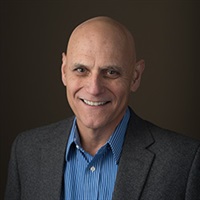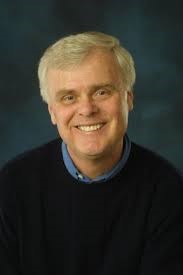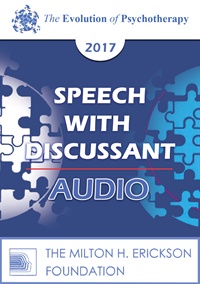EP17 Speech with Discussant 05 - Process-Based Therapy: The Future of Evidence-Based Care - Steven Hayes, PhD and David Burns, MD
Credit Available - See Credits tab below.
Total Credits: 1.5 including 1.5 A.P.A.
- Average Rating:
- Not yet rated
- Topic Areas:
- Speeches with Discussants | Psychotherapy | Future Oriented
- Categories:
- Evolution of Psychotherapy | Evolution of Psychotherapy 2017 | Online Continuing Education
- Faculty:
- Steven Hayes, PhD | David Burns, MD
- Duration:
- 1:26:46
- Format:
- Audio Only
- Original Program Date:
- Dec 16, 2017
- License:
- Never Expires.
Description
Description:
Evidence-based care is still the future of mental and behavioral health intervention, but not in the form of protocols for syndromes which has finally collapsed of its own weight. This talk is about what is arising in its place. I argue that process-based therapy is the logical next step in the evolution of evidence-based care: evidence-based processes linked to evidence-based procedures that alleviate the problems and promote the prosperity of people. Using the work on psychological flexibility as a foil, I explore how process-based therapy can help dissolve some of the long standing differences between the various wings of psychotherapy, and liberate the practices of practitioners who value an evidence-based approach.
Educational Objectives:
- Describe the traditional scientific approach to evidence-based therapy.
- Describe what successful mediational studies demonstrate.
- Define process-based therapy.
*Sessions may be edited for content and to preserve confidentiality*
Credits
1.5 credits available.
The Milton H. Erickson Foundation, Inc. is approved by the American Psychological Association to sponsor continuing education for psychologists. The Milton H. Erickson Foundation, Inc. maintains responsibility for this program and its content.
THE MILTON H. ERICKSON FOUNDATION Policy on Disclosure
The Milton H. Erickson Foundation is proud of the conferences and other
educational opportunities it sponsors, taking care that the conduct of
these activities conforms to the standards and principles of behavioral
and medical sciences, thus ensuring balance, independence, objectivity
and scientific rigor in all individually sponsored or jointly sponsored educational
activities.
All faculty members participating in a sponsored activity, and those who
review and therefore are in control of content, are requested to disclose
any relevant financial relationship prior to the CME activity, including but
not limited to specific commercial interests, financial remuneration received
by faculty member or spouse, and what role or activity was performed
for this remuneration. If a conflict of interest exists as a result of
a financial relationship it will be resolved prior to the activity. A faculty
member will not be allowed to present if the conflict is not or cannot be
resolved.
Faculty

Steven Hayes, PhD Related Seminars and Products
Steven C. Hayes, Ph.D Clinical Psychology, West Virginia University, Morgantown, is a Foundation Professor of Psychology at the University of Nevada. An author of 44 books and nearly 600 scientific articles, he is known for his work on Acceptance and Commitment Therapy, a widely used and researched method of psychological and behavioral intervention, and Relational Frame Theory, a comprehensive empirical research program on human language and cognition. Dr. Hayes has received the Lifetime Achievement Award from the Association for Behavioral and Cognitive Therapy, and is among the most cited psychologists in the word.

David Burns, MD Related Seminars and Products
David D. Burns is an adjunct professor emeritus in the Department of Psychiatry and Behavioral Sciences at the Stanford University School of Medicine and the author of the best-selling books Feeling Good: The New Mood Therapy and The Feeling Good Handbook. Burns popularized Aaron T. Beck's cognitive behavioral therapy (CBT) when his book became a best seller during the 1980s.


